Diploma of Community Service: WHS & Wellbeing Case Study on Ethics
VerifiedAdded on 2022/12/30
|11
|2965
|59
Case Study
AI Summary
This assignment presents a case study concerning a doctor accused of ethical breaches, including drugging and sexually assaulting a patient. The analysis explores violations of ethical and legal obligations, medical etiquette, and the impact on the workplace. The assignment further includes the development of a comprehensive ethics policy for a healthcare setting, focusing on empowerment, openness, respect, professionalism, and collaboration, along with steps to address ethical breaches. The solution then outlines strategies for supervision, debriefing, and crisis management, emphasizing the importance of professional boundaries, stress management, and the establishment of clear reporting and disciplinary procedures to ensure a safe and ethical work environment. Finally, it discusses patient rights, conflict of interest, and the safeguarding of healthcare information.
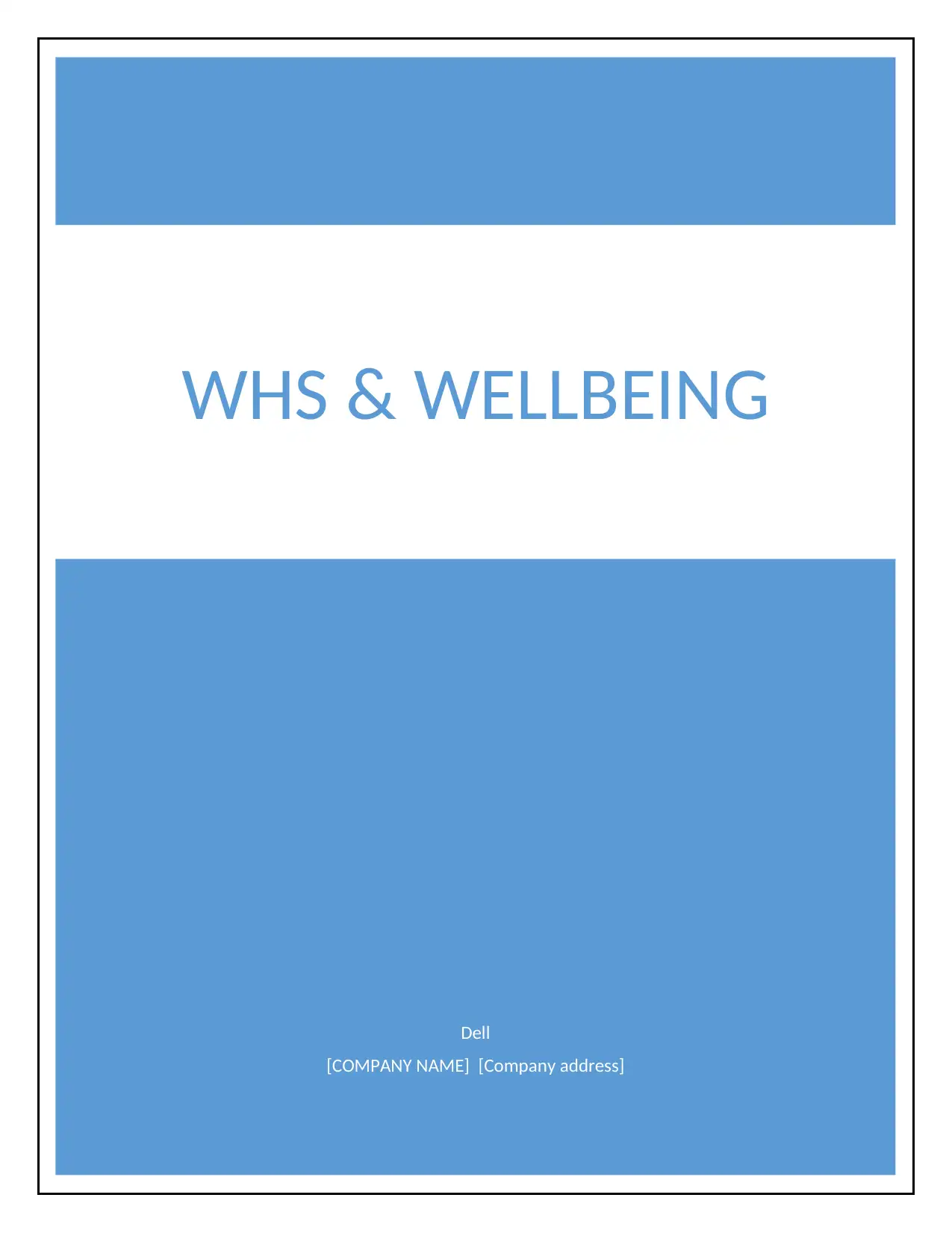
Dell
[COMPANY NAME] [Company address]
WHS & WELLBEING
[COMPANY NAME] [Company address]
WHS & WELLBEING
Paraphrase This Document
Need a fresh take? Get an instant paraphrase of this document with our AI Paraphraser
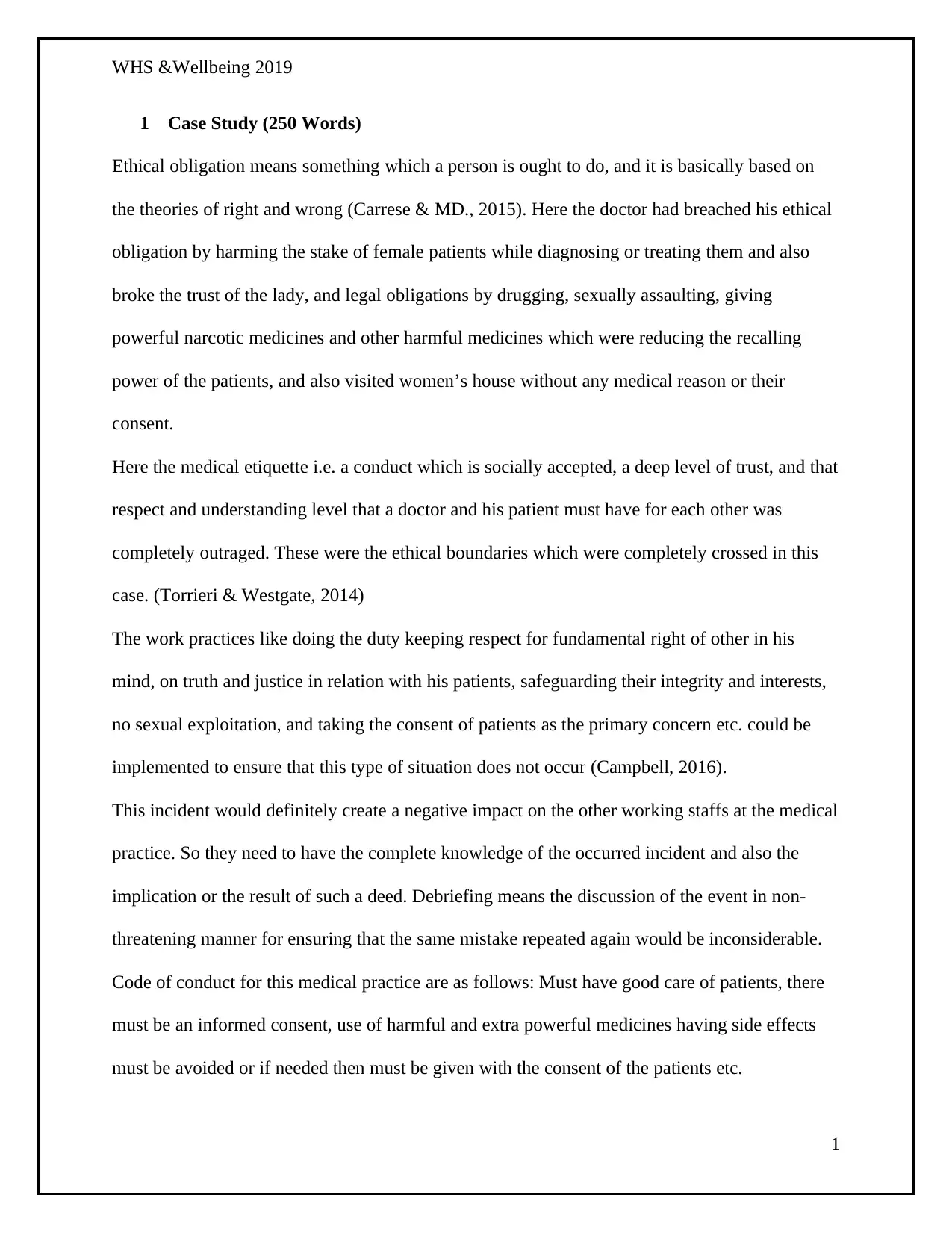
WHS &Wellbeing 2019
1 Case Study (250 Words)
Ethical obligation means something which a person is ought to do, and it is basically based on
the theories of right and wrong (Carrese & MD., 2015). Here the doctor had breached his ethical
obligation by harming the stake of female patients while diagnosing or treating them and also
broke the trust of the lady, and legal obligations by drugging, sexually assaulting, giving
powerful narcotic medicines and other harmful medicines which were reducing the recalling
power of the patients, and also visited women’s house without any medical reason or their
consent.
Here the medical etiquette i.e. a conduct which is socially accepted, a deep level of trust, and that
respect and understanding level that a doctor and his patient must have for each other was
completely outraged. These were the ethical boundaries which were completely crossed in this
case. (Torrieri & Westgate, 2014)
The work practices like doing the duty keeping respect for fundamental right of other in his
mind, on truth and justice in relation with his patients, safeguarding their integrity and interests,
no sexual exploitation, and taking the consent of patients as the primary concern etc. could be
implemented to ensure that this type of situation does not occur (Campbell, 2016).
This incident would definitely create a negative impact on the other working staffs at the medical
practice. So they need to have the complete knowledge of the occurred incident and also the
implication or the result of such a deed. Debriefing means the discussion of the event in non-
threatening manner for ensuring that the same mistake repeated again would be inconsiderable.
Code of conduct for this medical practice are as follows: Must have good care of patients, there
must be an informed consent, use of harmful and extra powerful medicines having side effects
must be avoided or if needed then must be given with the consent of the patients etc.
1
1 Case Study (250 Words)
Ethical obligation means something which a person is ought to do, and it is basically based on
the theories of right and wrong (Carrese & MD., 2015). Here the doctor had breached his ethical
obligation by harming the stake of female patients while diagnosing or treating them and also
broke the trust of the lady, and legal obligations by drugging, sexually assaulting, giving
powerful narcotic medicines and other harmful medicines which were reducing the recalling
power of the patients, and also visited women’s house without any medical reason or their
consent.
Here the medical etiquette i.e. a conduct which is socially accepted, a deep level of trust, and that
respect and understanding level that a doctor and his patient must have for each other was
completely outraged. These were the ethical boundaries which were completely crossed in this
case. (Torrieri & Westgate, 2014)
The work practices like doing the duty keeping respect for fundamental right of other in his
mind, on truth and justice in relation with his patients, safeguarding their integrity and interests,
no sexual exploitation, and taking the consent of patients as the primary concern etc. could be
implemented to ensure that this type of situation does not occur (Campbell, 2016).
This incident would definitely create a negative impact on the other working staffs at the medical
practice. So they need to have the complete knowledge of the occurred incident and also the
implication or the result of such a deed. Debriefing means the discussion of the event in non-
threatening manner for ensuring that the same mistake repeated again would be inconsiderable.
Code of conduct for this medical practice are as follows: Must have good care of patients, there
must be an informed consent, use of harmful and extra powerful medicines having side effects
must be avoided or if needed then must be given with the consent of the patients etc.
1
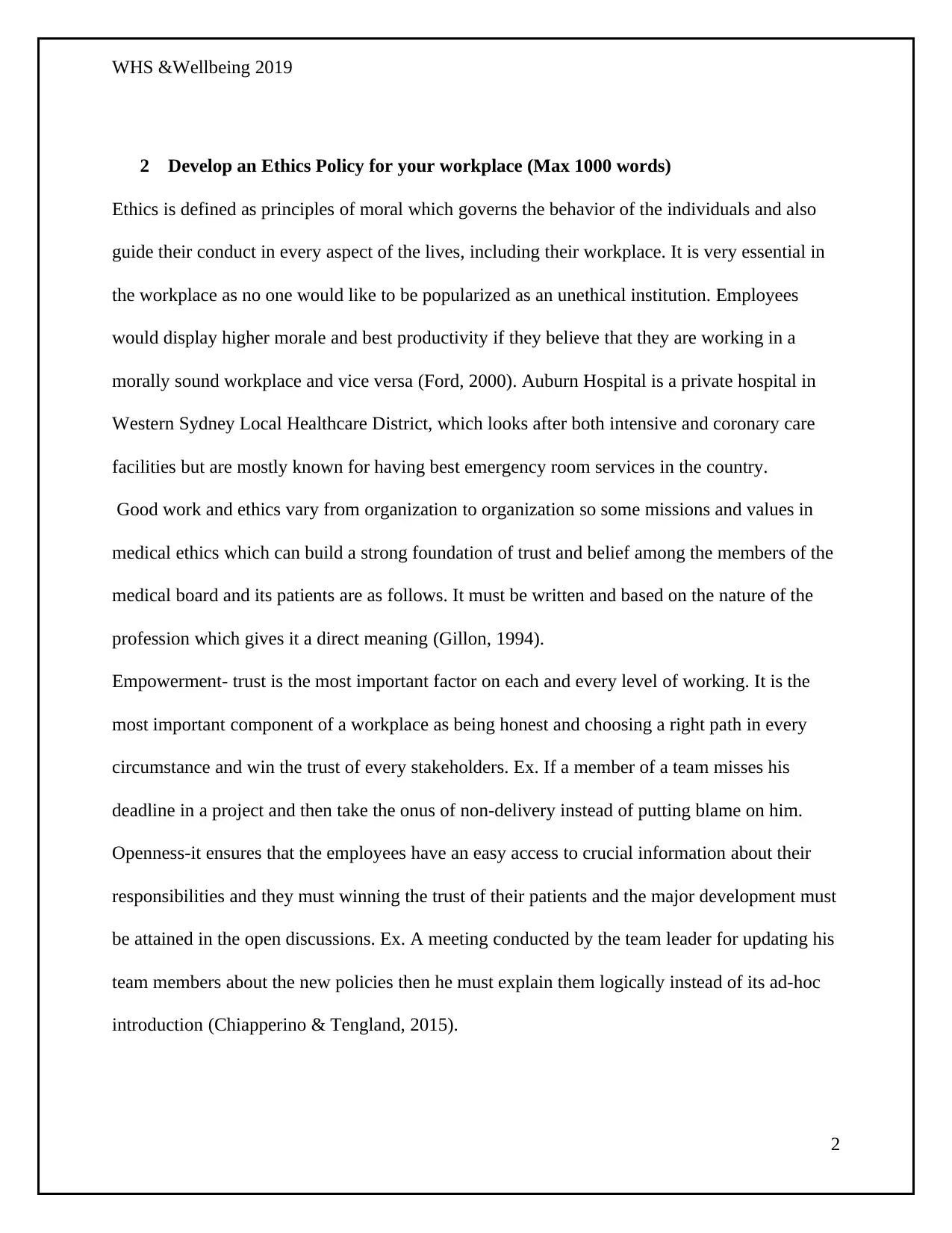
WHS &Wellbeing 2019
2 Develop an Ethics Policy for your workplace (Max 1000 words)
Ethics is defined as principles of moral which governs the behavior of the individuals and also
guide their conduct in every aspect of the lives, including their workplace. It is very essential in
the workplace as no one would like to be popularized as an unethical institution. Employees
would display higher morale and best productivity if they believe that they are working in a
morally sound workplace and vice versa (Ford, 2000). Auburn Hospital is a private hospital in
Western Sydney Local Healthcare District, which looks after both intensive and coronary care
facilities but are mostly known for having best emergency room services in the country.
Good work and ethics vary from organization to organization so some missions and values in
medical ethics which can build a strong foundation of trust and belief among the members of the
medical board and its patients are as follows. It must be written and based on the nature of the
profession which gives it a direct meaning (Gillon, 1994).
Empowerment- trust is the most important factor on each and every level of working. It is the
most important component of a workplace as being honest and choosing a right path in every
circumstance and win the trust of every stakeholders. Ex. If a member of a team misses his
deadline in a project and then take the onus of non-delivery instead of putting blame on him.
Openness-it ensures that the employees have an easy access to crucial information about their
responsibilities and they must winning the trust of their patients and the major development must
be attained in the open discussions. Ex. A meeting conducted by the team leader for updating his
team members about the new policies then he must explain them logically instead of its ad-hoc
introduction (Chiapperino & Tengland, 2015).
2
2 Develop an Ethics Policy for your workplace (Max 1000 words)
Ethics is defined as principles of moral which governs the behavior of the individuals and also
guide their conduct in every aspect of the lives, including their workplace. It is very essential in
the workplace as no one would like to be popularized as an unethical institution. Employees
would display higher morale and best productivity if they believe that they are working in a
morally sound workplace and vice versa (Ford, 2000). Auburn Hospital is a private hospital in
Western Sydney Local Healthcare District, which looks after both intensive and coronary care
facilities but are mostly known for having best emergency room services in the country.
Good work and ethics vary from organization to organization so some missions and values in
medical ethics which can build a strong foundation of trust and belief among the members of the
medical board and its patients are as follows. It must be written and based on the nature of the
profession which gives it a direct meaning (Gillon, 1994).
Empowerment- trust is the most important factor on each and every level of working. It is the
most important component of a workplace as being honest and choosing a right path in every
circumstance and win the trust of every stakeholders. Ex. If a member of a team misses his
deadline in a project and then take the onus of non-delivery instead of putting blame on him.
Openness-it ensures that the employees have an easy access to crucial information about their
responsibilities and they must winning the trust of their patients and the major development must
be attained in the open discussions. Ex. A meeting conducted by the team leader for updating his
team members about the new policies then he must explain them logically instead of its ad-hoc
introduction (Chiapperino & Tengland, 2015).
2
⊘ This is a preview!⊘
Do you want full access?
Subscribe today to unlock all pages.

Trusted by 1+ million students worldwide
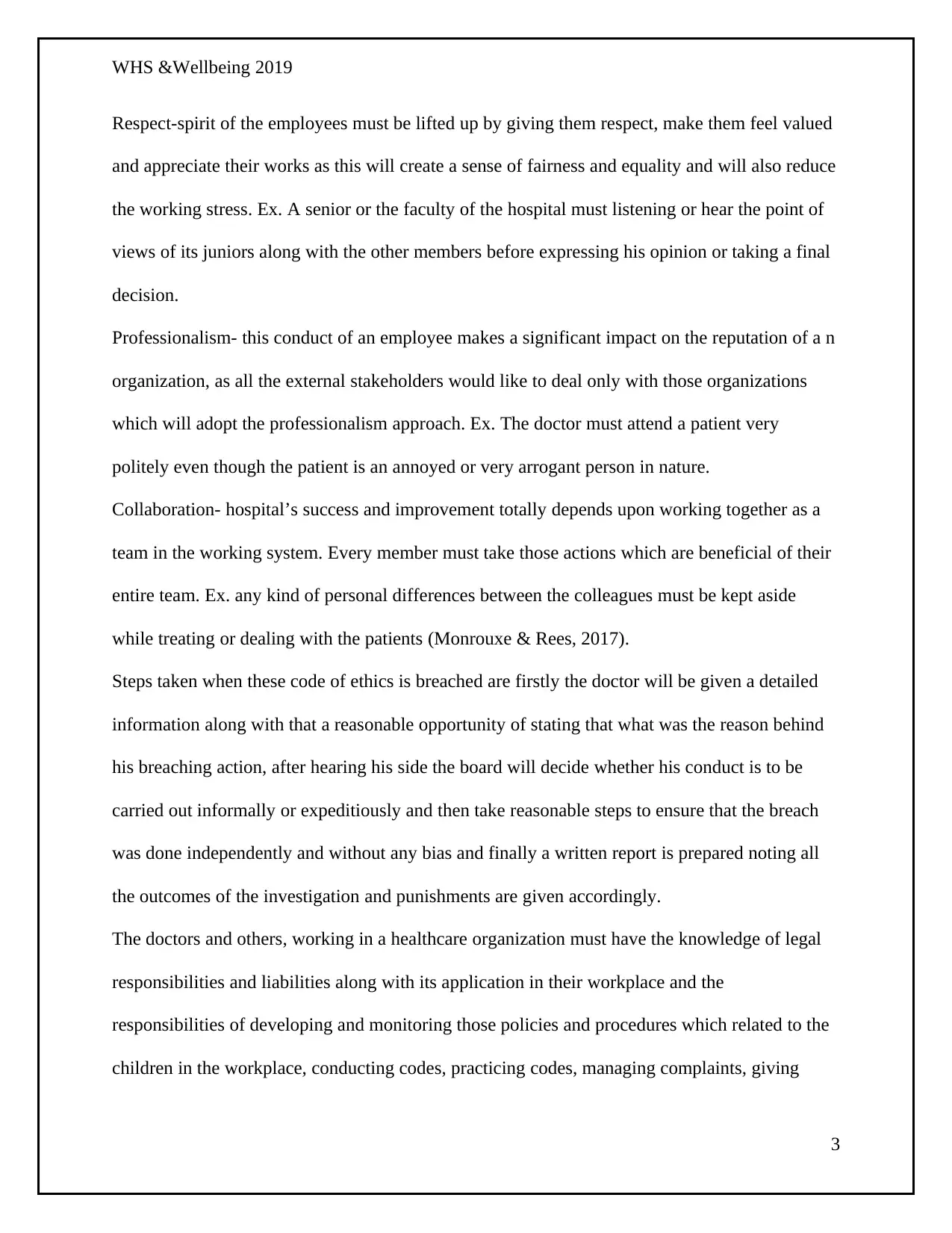
WHS &Wellbeing 2019
Respect-spirit of the employees must be lifted up by giving them respect, make them feel valued
and appreciate their works as this will create a sense of fairness and equality and will also reduce
the working stress. Ex. A senior or the faculty of the hospital must listening or hear the point of
views of its juniors along with the other members before expressing his opinion or taking a final
decision.
Professionalism- this conduct of an employee makes a significant impact on the reputation of a n
organization, as all the external stakeholders would like to deal only with those organizations
which will adopt the professionalism approach. Ex. The doctor must attend a patient very
politely even though the patient is an annoyed or very arrogant person in nature.
Collaboration- hospital’s success and improvement totally depends upon working together as a
team in the working system. Every member must take those actions which are beneficial of their
entire team. Ex. any kind of personal differences between the colleagues must be kept aside
while treating or dealing with the patients (Monrouxe & Rees, 2017).
Steps taken when these code of ethics is breached are firstly the doctor will be given a detailed
information along with that a reasonable opportunity of stating that what was the reason behind
his breaching action, after hearing his side the board will decide whether his conduct is to be
carried out informally or expeditiously and then take reasonable steps to ensure that the breach
was done independently and without any bias and finally a written report is prepared noting all
the outcomes of the investigation and punishments are given accordingly.
The doctors and others, working in a healthcare organization must have the knowledge of legal
responsibilities and liabilities along with its application in their workplace and the
responsibilities of developing and monitoring those policies and procedures which related to the
children in the workplace, conducting codes, practicing codes, managing complaints, giving
3
Respect-spirit of the employees must be lifted up by giving them respect, make them feel valued
and appreciate their works as this will create a sense of fairness and equality and will also reduce
the working stress. Ex. A senior or the faculty of the hospital must listening or hear the point of
views of its juniors along with the other members before expressing his opinion or taking a final
decision.
Professionalism- this conduct of an employee makes a significant impact on the reputation of a n
organization, as all the external stakeholders would like to deal only with those organizations
which will adopt the professionalism approach. Ex. The doctor must attend a patient very
politely even though the patient is an annoyed or very arrogant person in nature.
Collaboration- hospital’s success and improvement totally depends upon working together as a
team in the working system. Every member must take those actions which are beneficial of their
entire team. Ex. any kind of personal differences between the colleagues must be kept aside
while treating or dealing with the patients (Monrouxe & Rees, 2017).
Steps taken when these code of ethics is breached are firstly the doctor will be given a detailed
information along with that a reasonable opportunity of stating that what was the reason behind
his breaching action, after hearing his side the board will decide whether his conduct is to be
carried out informally or expeditiously and then take reasonable steps to ensure that the breach
was done independently and without any bias and finally a written report is prepared noting all
the outcomes of the investigation and punishments are given accordingly.
The doctors and others, working in a healthcare organization must have the knowledge of legal
responsibilities and liabilities along with its application in their workplace and the
responsibilities of developing and monitoring those policies and procedures which related to the
children in the workplace, conducting codes, practicing codes, managing complaints, giving
3
Paraphrase This Document
Need a fresh take? Get an instant paraphrase of this document with our AI Paraphraser
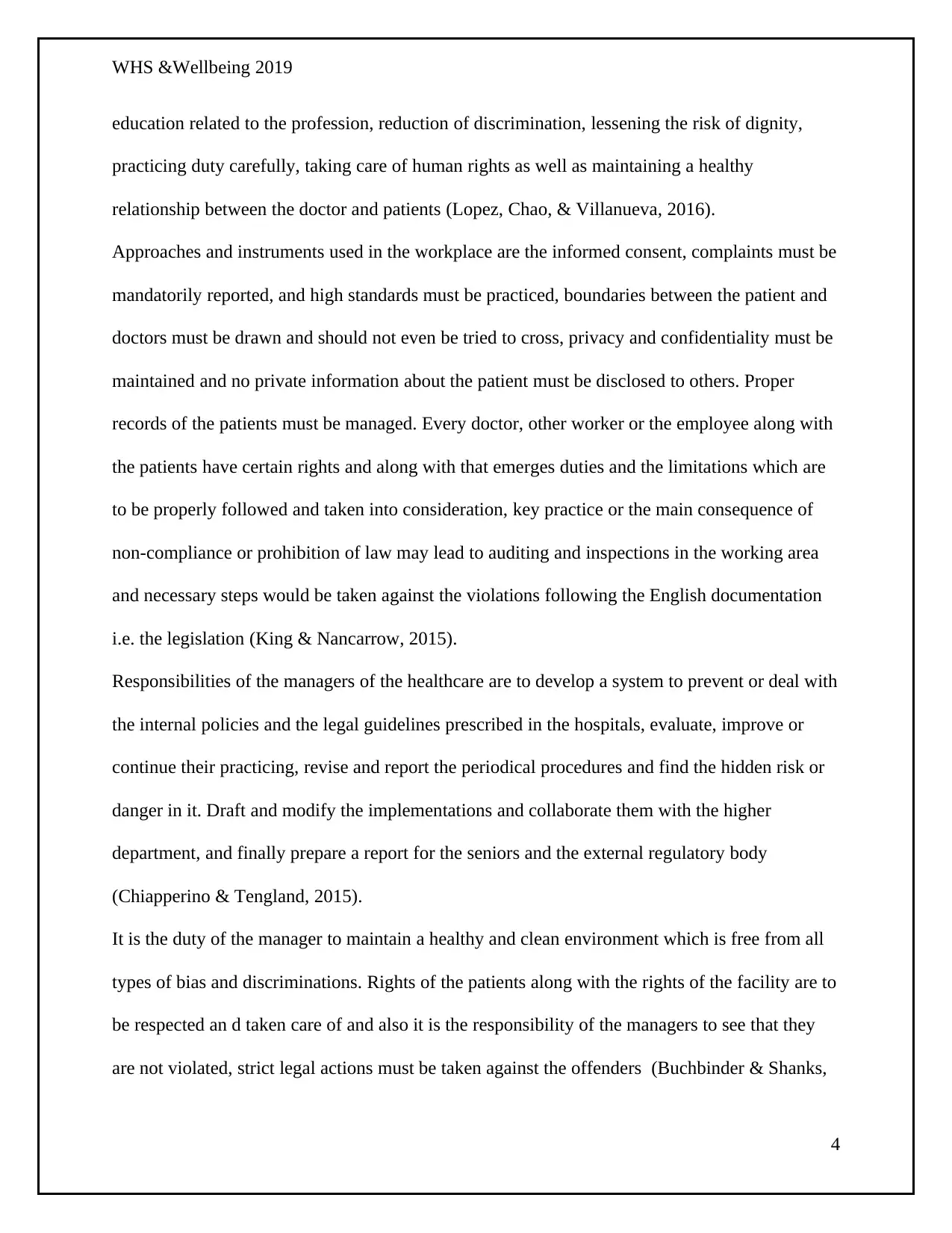
WHS &Wellbeing 2019
education related to the profession, reduction of discrimination, lessening the risk of dignity,
practicing duty carefully, taking care of human rights as well as maintaining a healthy
relationship between the doctor and patients (Lopez, Chao, & Villanueva, 2016).
Approaches and instruments used in the workplace are the informed consent, complaints must be
mandatorily reported, and high standards must be practiced, boundaries between the patient and
doctors must be drawn and should not even be tried to cross, privacy and confidentiality must be
maintained and no private information about the patient must be disclosed to others. Proper
records of the patients must be managed. Every doctor, other worker or the employee along with
the patients have certain rights and along with that emerges duties and the limitations which are
to be properly followed and taken into consideration, key practice or the main consequence of
non-compliance or prohibition of law may lead to auditing and inspections in the working area
and necessary steps would be taken against the violations following the English documentation
i.e. the legislation (King & Nancarrow, 2015).
Responsibilities of the managers of the healthcare are to develop a system to prevent or deal with
the internal policies and the legal guidelines prescribed in the hospitals, evaluate, improve or
continue their practicing, revise and report the periodical procedures and find the hidden risk or
danger in it. Draft and modify the implementations and collaborate them with the higher
department, and finally prepare a report for the seniors and the external regulatory body
(Chiapperino & Tengland, 2015).
It is the duty of the manager to maintain a healthy and clean environment which is free from all
types of bias and discriminations. Rights of the patients along with the rights of the facility are to
be respected an d taken care of and also it is the responsibility of the managers to see that they
are not violated, strict legal actions must be taken against the offenders (Buchbinder & Shanks,
4
education related to the profession, reduction of discrimination, lessening the risk of dignity,
practicing duty carefully, taking care of human rights as well as maintaining a healthy
relationship between the doctor and patients (Lopez, Chao, & Villanueva, 2016).
Approaches and instruments used in the workplace are the informed consent, complaints must be
mandatorily reported, and high standards must be practiced, boundaries between the patient and
doctors must be drawn and should not even be tried to cross, privacy and confidentiality must be
maintained and no private information about the patient must be disclosed to others. Proper
records of the patients must be managed. Every doctor, other worker or the employee along with
the patients have certain rights and along with that emerges duties and the limitations which are
to be properly followed and taken into consideration, key practice or the main consequence of
non-compliance or prohibition of law may lead to auditing and inspections in the working area
and necessary steps would be taken against the violations following the English documentation
i.e. the legislation (King & Nancarrow, 2015).
Responsibilities of the managers of the healthcare are to develop a system to prevent or deal with
the internal policies and the legal guidelines prescribed in the hospitals, evaluate, improve or
continue their practicing, revise and report the periodical procedures and find the hidden risk or
danger in it. Draft and modify the implementations and collaborate them with the higher
department, and finally prepare a report for the seniors and the external regulatory body
(Chiapperino & Tengland, 2015).
It is the duty of the manager to maintain a healthy and clean environment which is free from all
types of bias and discriminations. Rights of the patients along with the rights of the facility are to
be respected an d taken care of and also it is the responsibility of the managers to see that they
are not violated, strict legal actions must be taken against the offenders (Buchbinder & Shanks,
4
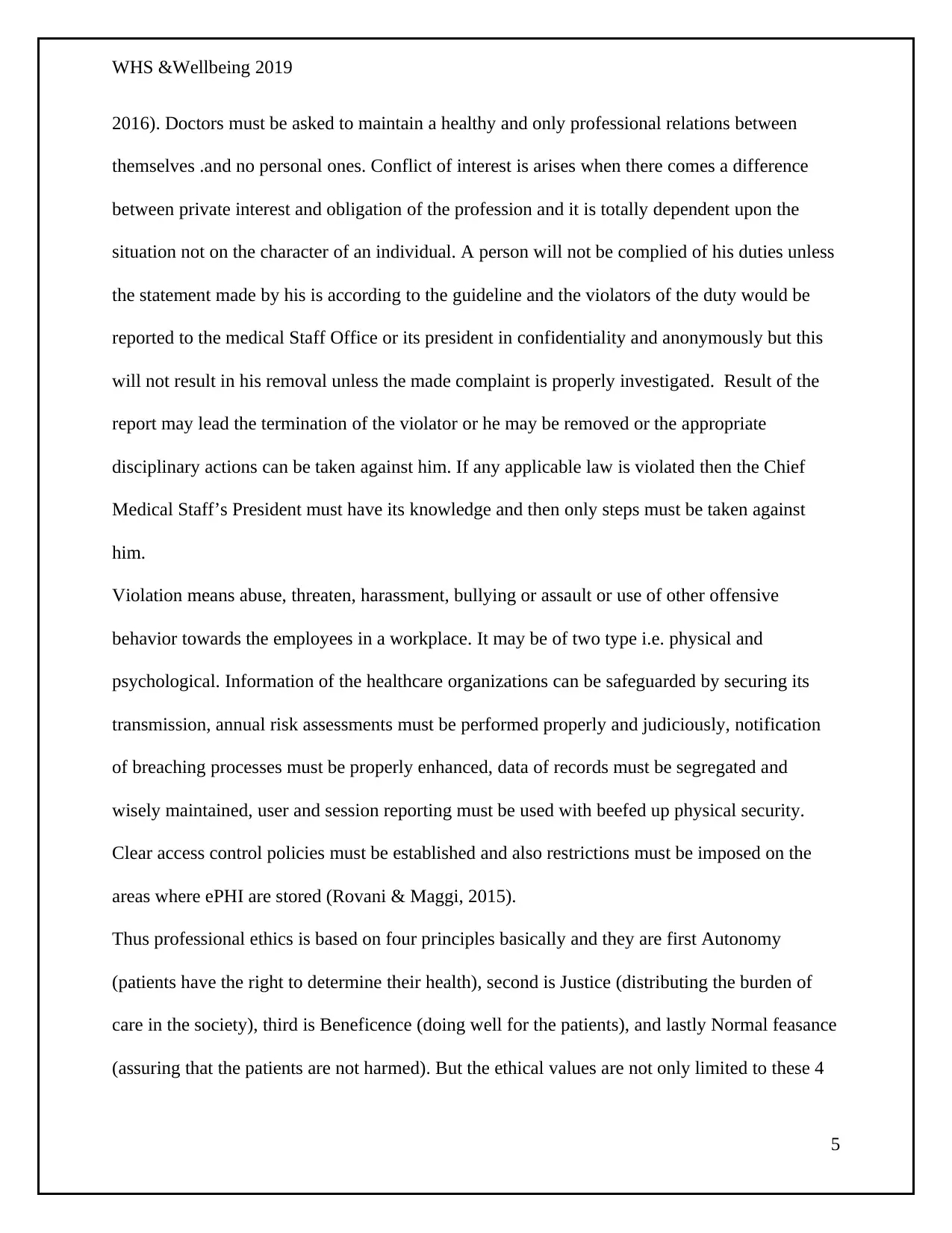
WHS &Wellbeing 2019
2016). Doctors must be asked to maintain a healthy and only professional relations between
themselves .and no personal ones. Conflict of interest is arises when there comes a difference
between private interest and obligation of the profession and it is totally dependent upon the
situation not on the character of an individual. A person will not be complied of his duties unless
the statement made by his is according to the guideline and the violators of the duty would be
reported to the medical Staff Office or its president in confidentiality and anonymously but this
will not result in his removal unless the made complaint is properly investigated. Result of the
report may lead the termination of the violator or he may be removed or the appropriate
disciplinary actions can be taken against him. If any applicable law is violated then the Chief
Medical Staff’s President must have its knowledge and then only steps must be taken against
him.
Violation means abuse, threaten, harassment, bullying or assault or use of other offensive
behavior towards the employees in a workplace. It may be of two type i.e. physical and
psychological. Information of the healthcare organizations can be safeguarded by securing its
transmission, annual risk assessments must be performed properly and judiciously, notification
of breaching processes must be properly enhanced, data of records must be segregated and
wisely maintained, user and session reporting must be used with beefed up physical security.
Clear access control policies must be established and also restrictions must be imposed on the
areas where ePHI are stored (Rovani & Maggi, 2015).
Thus professional ethics is based on four principles basically and they are first Autonomy
(patients have the right to determine their health), second is Justice (distributing the burden of
care in the society), third is Beneficence (doing well for the patients), and lastly Normal feasance
(assuring that the patients are not harmed). But the ethical values are not only limited to these 4
5
2016). Doctors must be asked to maintain a healthy and only professional relations between
themselves .and no personal ones. Conflict of interest is arises when there comes a difference
between private interest and obligation of the profession and it is totally dependent upon the
situation not on the character of an individual. A person will not be complied of his duties unless
the statement made by his is according to the guideline and the violators of the duty would be
reported to the medical Staff Office or its president in confidentiality and anonymously but this
will not result in his removal unless the made complaint is properly investigated. Result of the
report may lead the termination of the violator or he may be removed or the appropriate
disciplinary actions can be taken against him. If any applicable law is violated then the Chief
Medical Staff’s President must have its knowledge and then only steps must be taken against
him.
Violation means abuse, threaten, harassment, bullying or assault or use of other offensive
behavior towards the employees in a workplace. It may be of two type i.e. physical and
psychological. Information of the healthcare organizations can be safeguarded by securing its
transmission, annual risk assessments must be performed properly and judiciously, notification
of breaching processes must be properly enhanced, data of records must be segregated and
wisely maintained, user and session reporting must be used with beefed up physical security.
Clear access control policies must be established and also restrictions must be imposed on the
areas where ePHI are stored (Rovani & Maggi, 2015).
Thus professional ethics is based on four principles basically and they are first Autonomy
(patients have the right to determine their health), second is Justice (distributing the burden of
care in the society), third is Beneficence (doing well for the patients), and lastly Normal feasance
(assuring that the patients are not harmed). But the ethical values are not only limited to these 4
5
⊘ This is a preview!⊘
Do you want full access?
Subscribe today to unlock all pages.

Trusted by 1+ million students worldwide
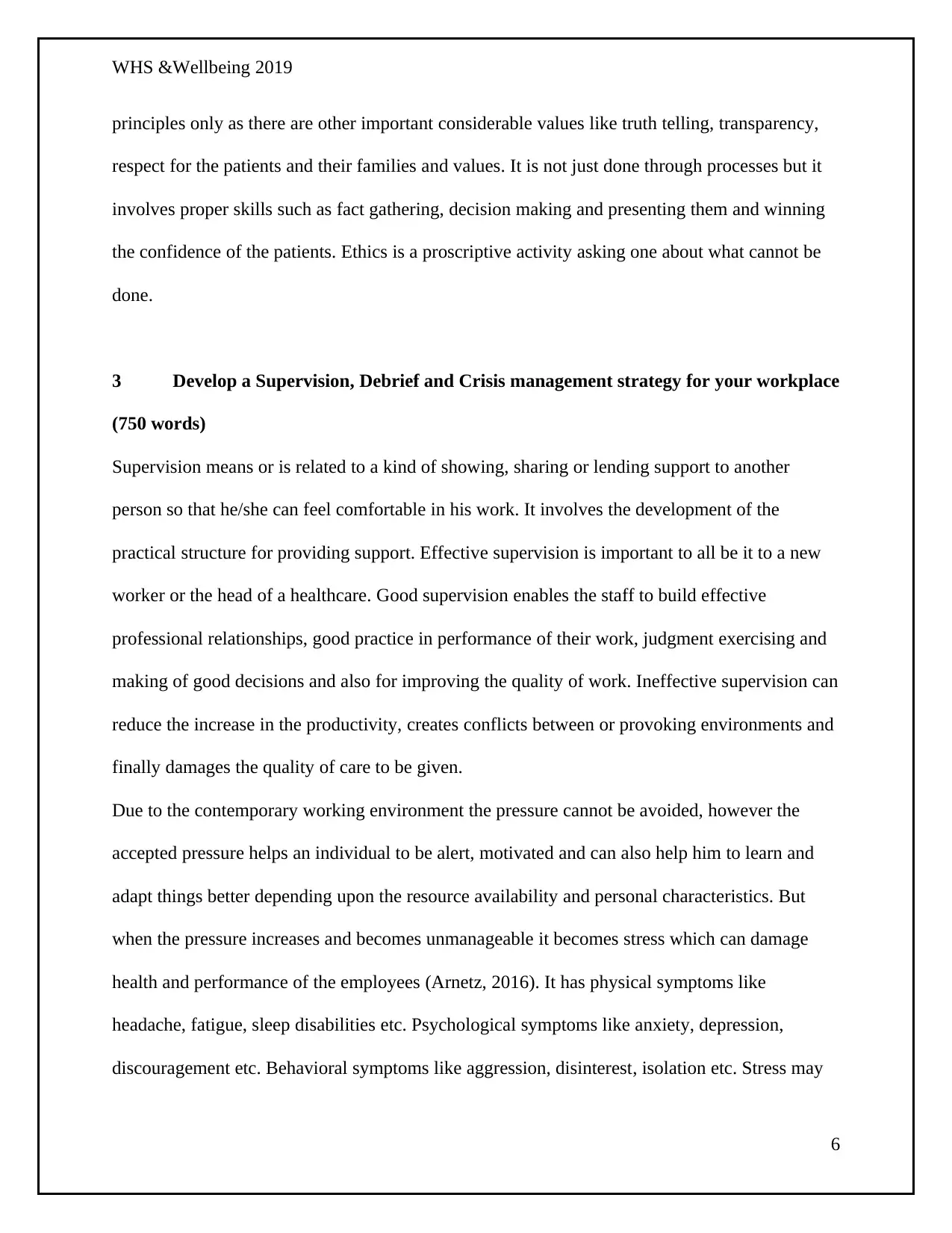
WHS &Wellbeing 2019
principles only as there are other important considerable values like truth telling, transparency,
respect for the patients and their families and values. It is not just done through processes but it
involves proper skills such as fact gathering, decision making and presenting them and winning
the confidence of the patients. Ethics is a proscriptive activity asking one about what cannot be
done.
3 Develop a Supervision, Debrief and Crisis management strategy for your workplace
(750 words)
Supervision means or is related to a kind of showing, sharing or lending support to another
person so that he/she can feel comfortable in his work. It involves the development of the
practical structure for providing support. Effective supervision is important to all be it to a new
worker or the head of a healthcare. Good supervision enables the staff to build effective
professional relationships, good practice in performance of their work, judgment exercising and
making of good decisions and also for improving the quality of work. Ineffective supervision can
reduce the increase in the productivity, creates conflicts between or provoking environments and
finally damages the quality of care to be given.
Due to the contemporary working environment the pressure cannot be avoided, however the
accepted pressure helps an individual to be alert, motivated and can also help him to learn and
adapt things better depending upon the resource availability and personal characteristics. But
when the pressure increases and becomes unmanageable it becomes stress which can damage
health and performance of the employees (Arnetz, 2016). It has physical symptoms like
headache, fatigue, sleep disabilities etc. Psychological symptoms like anxiety, depression,
discouragement etc. Behavioral symptoms like aggression, disinterest, isolation etc. Stress may
6
principles only as there are other important considerable values like truth telling, transparency,
respect for the patients and their families and values. It is not just done through processes but it
involves proper skills such as fact gathering, decision making and presenting them and winning
the confidence of the patients. Ethics is a proscriptive activity asking one about what cannot be
done.
3 Develop a Supervision, Debrief and Crisis management strategy for your workplace
(750 words)
Supervision means or is related to a kind of showing, sharing or lending support to another
person so that he/she can feel comfortable in his work. It involves the development of the
practical structure for providing support. Effective supervision is important to all be it to a new
worker or the head of a healthcare. Good supervision enables the staff to build effective
professional relationships, good practice in performance of their work, judgment exercising and
making of good decisions and also for improving the quality of work. Ineffective supervision can
reduce the increase in the productivity, creates conflicts between or provoking environments and
finally damages the quality of care to be given.
Due to the contemporary working environment the pressure cannot be avoided, however the
accepted pressure helps an individual to be alert, motivated and can also help him to learn and
adapt things better depending upon the resource availability and personal characteristics. But
when the pressure increases and becomes unmanageable it becomes stress which can damage
health and performance of the employees (Arnetz, 2016). It has physical symptoms like
headache, fatigue, sleep disabilities etc. Psychological symptoms like anxiety, depression,
discouragement etc. Behavioral symptoms like aggression, disinterest, isolation etc. Stress may
6
Paraphrase This Document
Need a fresh take? Get an instant paraphrase of this document with our AI Paraphraser
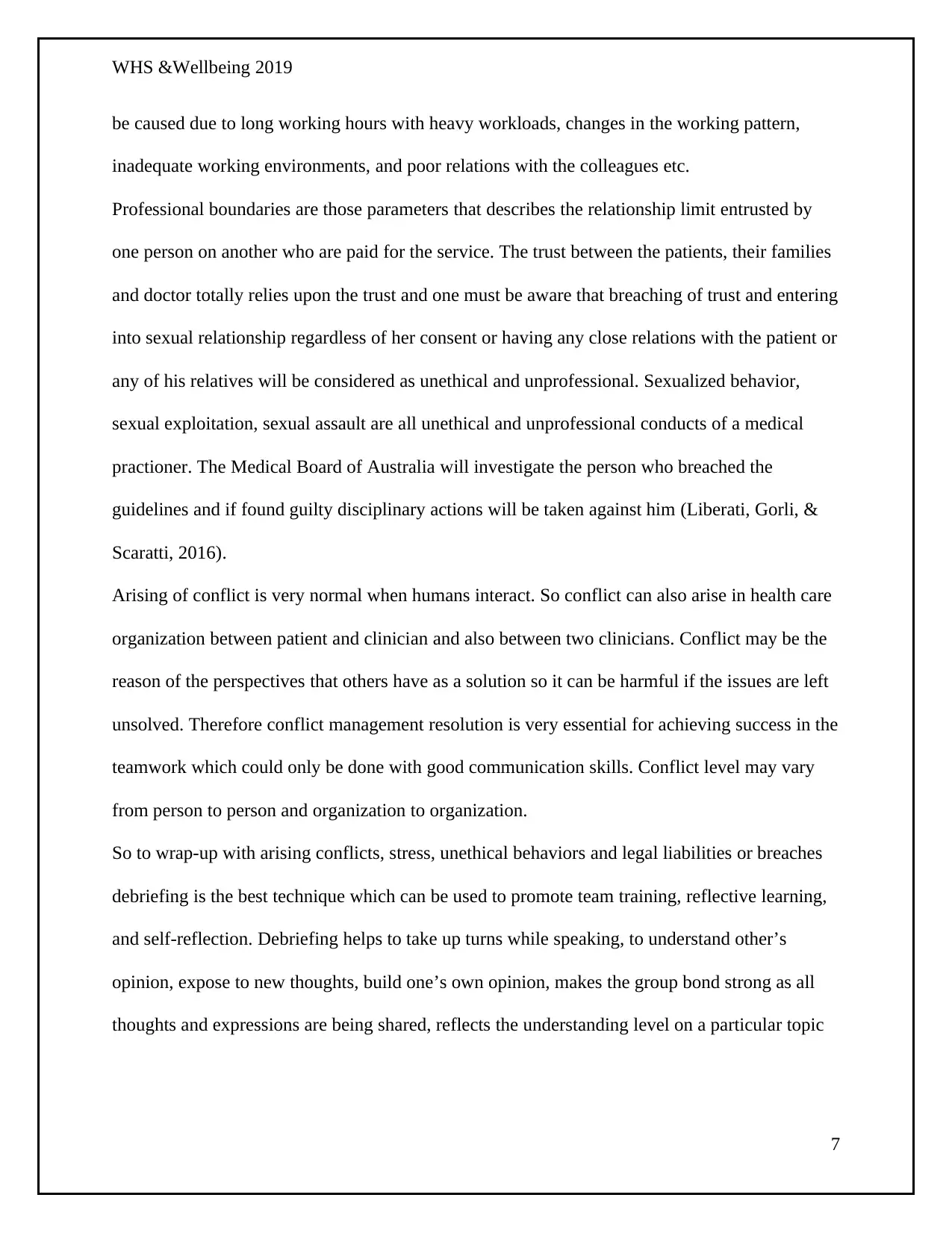
WHS &Wellbeing 2019
be caused due to long working hours with heavy workloads, changes in the working pattern,
inadequate working environments, and poor relations with the colleagues etc.
Professional boundaries are those parameters that describes the relationship limit entrusted by
one person on another who are paid for the service. The trust between the patients, their families
and doctor totally relies upon the trust and one must be aware that breaching of trust and entering
into sexual relationship regardless of her consent or having any close relations with the patient or
any of his relatives will be considered as unethical and unprofessional. Sexualized behavior,
sexual exploitation, sexual assault are all unethical and unprofessional conducts of a medical
practioner. The Medical Board of Australia will investigate the person who breached the
guidelines and if found guilty disciplinary actions will be taken against him (Liberati, Gorli, &
Scaratti, 2016).
Arising of conflict is very normal when humans interact. So conflict can also arise in health care
organization between patient and clinician and also between two clinicians. Conflict may be the
reason of the perspectives that others have as a solution so it can be harmful if the issues are left
unsolved. Therefore conflict management resolution is very essential for achieving success in the
teamwork which could only be done with good communication skills. Conflict level may vary
from person to person and organization to organization.
So to wrap-up with arising conflicts, stress, unethical behaviors and legal liabilities or breaches
debriefing is the best technique which can be used to promote team training, reflective learning,
and self-reflection. Debriefing helps to take up turns while speaking, to understand other’s
opinion, expose to new thoughts, build one’s own opinion, makes the group bond strong as all
thoughts and expressions are being shared, reflects the understanding level on a particular topic
7
be caused due to long working hours with heavy workloads, changes in the working pattern,
inadequate working environments, and poor relations with the colleagues etc.
Professional boundaries are those parameters that describes the relationship limit entrusted by
one person on another who are paid for the service. The trust between the patients, their families
and doctor totally relies upon the trust and one must be aware that breaching of trust and entering
into sexual relationship regardless of her consent or having any close relations with the patient or
any of his relatives will be considered as unethical and unprofessional. Sexualized behavior,
sexual exploitation, sexual assault are all unethical and unprofessional conducts of a medical
practioner. The Medical Board of Australia will investigate the person who breached the
guidelines and if found guilty disciplinary actions will be taken against him (Liberati, Gorli, &
Scaratti, 2016).
Arising of conflict is very normal when humans interact. So conflict can also arise in health care
organization between patient and clinician and also between two clinicians. Conflict may be the
reason of the perspectives that others have as a solution so it can be harmful if the issues are left
unsolved. Therefore conflict management resolution is very essential for achieving success in the
teamwork which could only be done with good communication skills. Conflict level may vary
from person to person and organization to organization.
So to wrap-up with arising conflicts, stress, unethical behaviors and legal liabilities or breaches
debriefing is the best technique which can be used to promote team training, reflective learning,
and self-reflection. Debriefing helps to take up turns while speaking, to understand other’s
opinion, expose to new thoughts, build one’s own opinion, makes the group bond strong as all
thoughts and expressions are being shared, reflects the understanding level on a particular topic
7
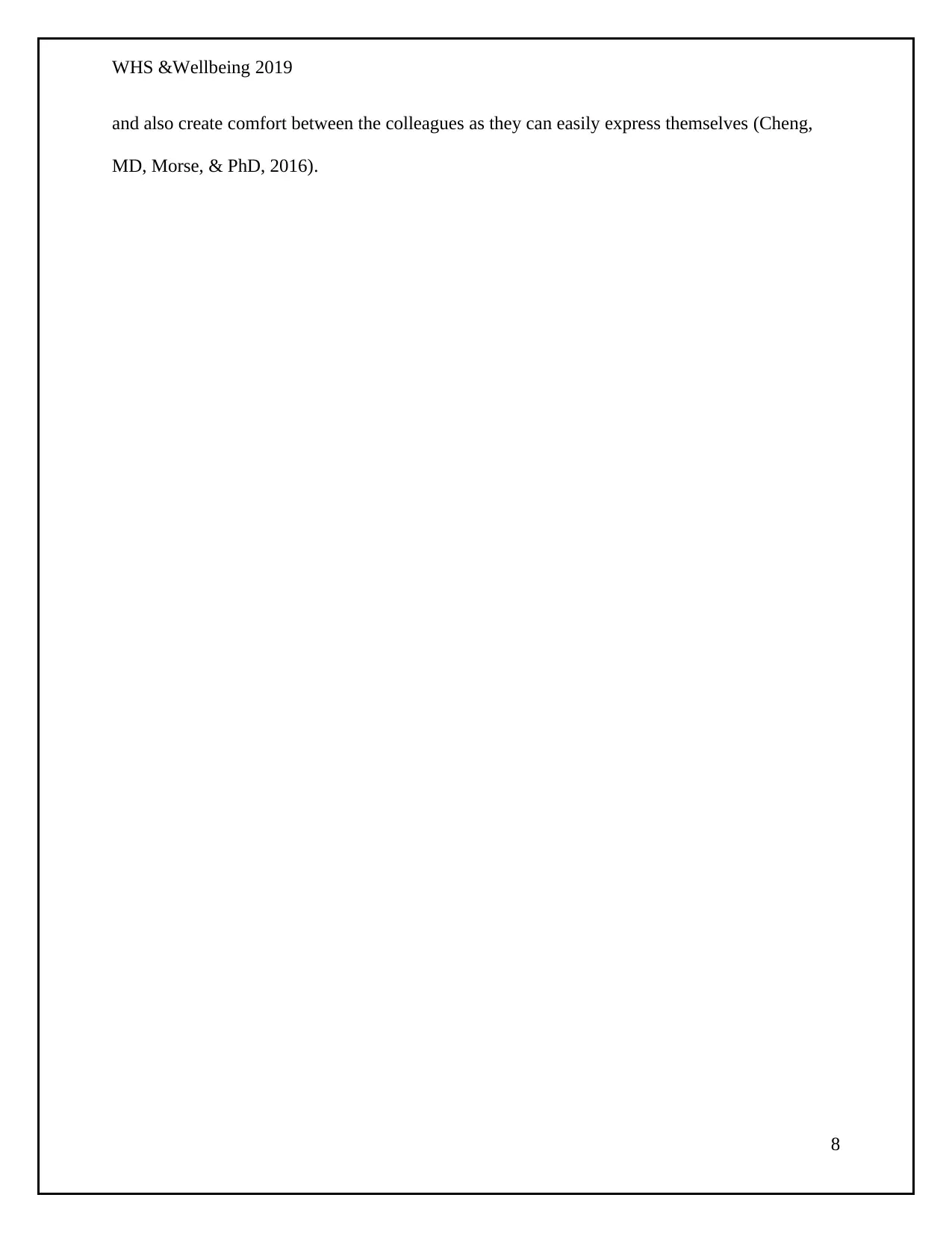
WHS &Wellbeing 2019
and also create comfort between the colleagues as they can easily express themselves (Cheng,
MD, Morse, & PhD, 2016).
8
and also create comfort between the colleagues as they can easily express themselves (Cheng,
MD, Morse, & PhD, 2016).
8
⊘ This is a preview!⊘
Do you want full access?
Subscribe today to unlock all pages.

Trusted by 1+ million students worldwide
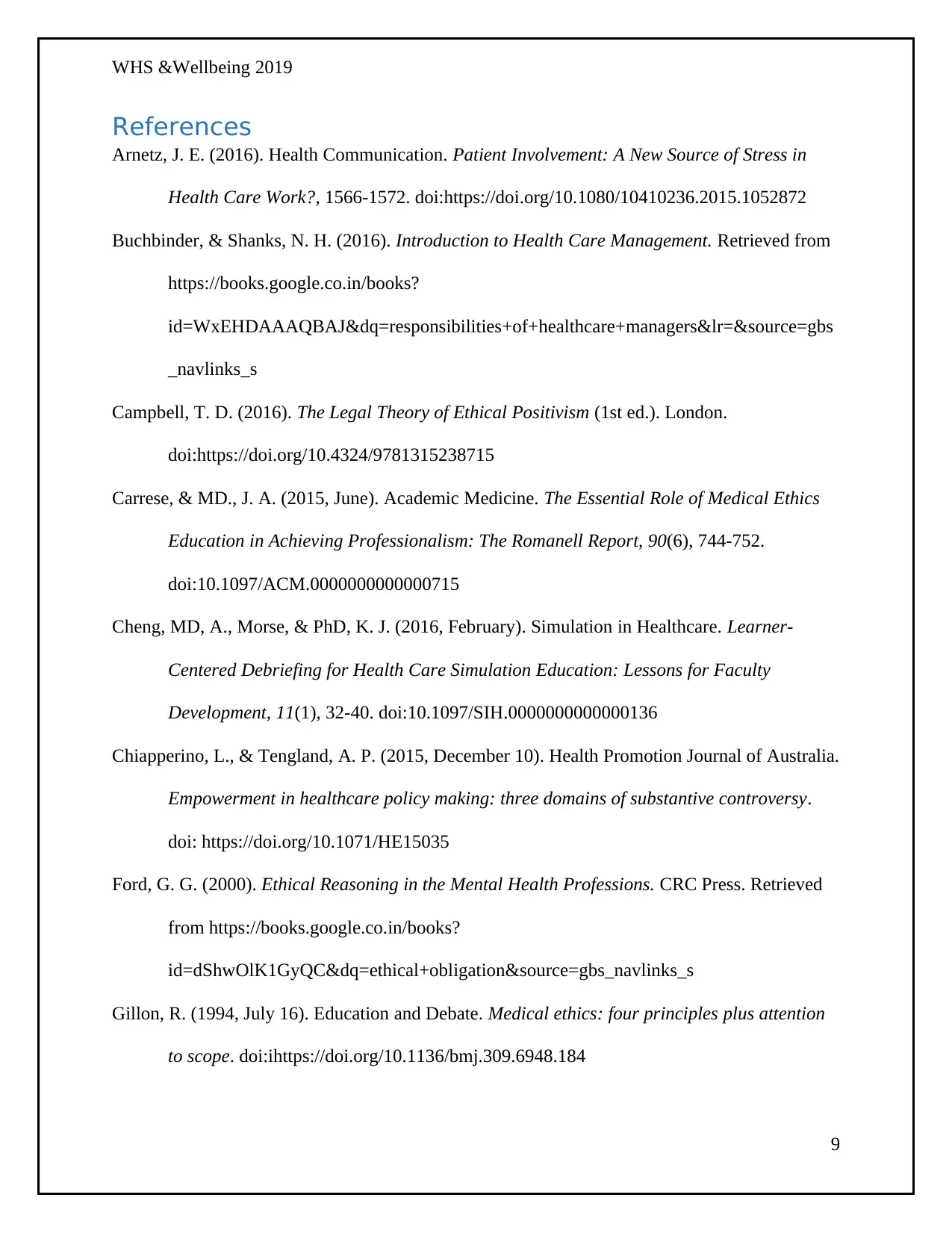
WHS &Wellbeing 2019
References
Arnetz, J. E. (2016). Health Communication. Patient Involvement: A New Source of Stress in
Health Care Work?, 1566-1572. doi:https://doi.org/10.1080/10410236.2015.1052872
Buchbinder, & Shanks, N. H. (2016). Introduction to Health Care Management. Retrieved from
https://books.google.co.in/books?
id=WxEHDAAAQBAJ&dq=responsibilities+of+healthcare+managers&lr=&source=gbs
_navlinks_s
Campbell, T. D. (2016). The Legal Theory of Ethical Positivism (1st ed.). London.
doi:https://doi.org/10.4324/9781315238715
Carrese, & MD., J. A. (2015, June). Academic Medicine. The Essential Role of Medical Ethics
Education in Achieving Professionalism: The Romanell Report, 90(6), 744-752.
doi:10.1097/ACM.0000000000000715
Cheng, MD, A., Morse, & PhD, K. J. (2016, February). Simulation in Healthcare. Learner-
Centered Debriefing for Health Care Simulation Education: Lessons for Faculty
Development, 11(1), 32-40. doi:10.1097/SIH.0000000000000136
Chiapperino, L., & Tengland, A. P. (2015, December 10). Health Promotion Journal of Australia.
Empowerment in healthcare policy making: three domains of substantive controversy.
doi: https://doi.org/10.1071/HE15035
Ford, G. G. (2000). Ethical Reasoning in the Mental Health Professions. CRC Press. Retrieved
from https://books.google.co.in/books?
id=dShwOlK1GyQC&dq=ethical+obligation&source=gbs_navlinks_s
Gillon, R. (1994, July 16). Education and Debate. Medical ethics: four principles plus attention
to scope. doi:ihttps://doi.org/10.1136/bmj.309.6948.184
9
References
Arnetz, J. E. (2016). Health Communication. Patient Involvement: A New Source of Stress in
Health Care Work?, 1566-1572. doi:https://doi.org/10.1080/10410236.2015.1052872
Buchbinder, & Shanks, N. H. (2016). Introduction to Health Care Management. Retrieved from
https://books.google.co.in/books?
id=WxEHDAAAQBAJ&dq=responsibilities+of+healthcare+managers&lr=&source=gbs
_navlinks_s
Campbell, T. D. (2016). The Legal Theory of Ethical Positivism (1st ed.). London.
doi:https://doi.org/10.4324/9781315238715
Carrese, & MD., J. A. (2015, June). Academic Medicine. The Essential Role of Medical Ethics
Education in Achieving Professionalism: The Romanell Report, 90(6), 744-752.
doi:10.1097/ACM.0000000000000715
Cheng, MD, A., Morse, & PhD, K. J. (2016, February). Simulation in Healthcare. Learner-
Centered Debriefing for Health Care Simulation Education: Lessons for Faculty
Development, 11(1), 32-40. doi:10.1097/SIH.0000000000000136
Chiapperino, L., & Tengland, A. P. (2015, December 10). Health Promotion Journal of Australia.
Empowerment in healthcare policy making: three domains of substantive controversy.
doi: https://doi.org/10.1071/HE15035
Ford, G. G. (2000). Ethical Reasoning in the Mental Health Professions. CRC Press. Retrieved
from https://books.google.co.in/books?
id=dShwOlK1GyQC&dq=ethical+obligation&source=gbs_navlinks_s
Gillon, R. (1994, July 16). Education and Debate. Medical ethics: four principles plus attention
to scope. doi:ihttps://doi.org/10.1136/bmj.309.6948.184
9
Paraphrase This Document
Need a fresh take? Get an instant paraphrase of this document with our AI Paraphraser
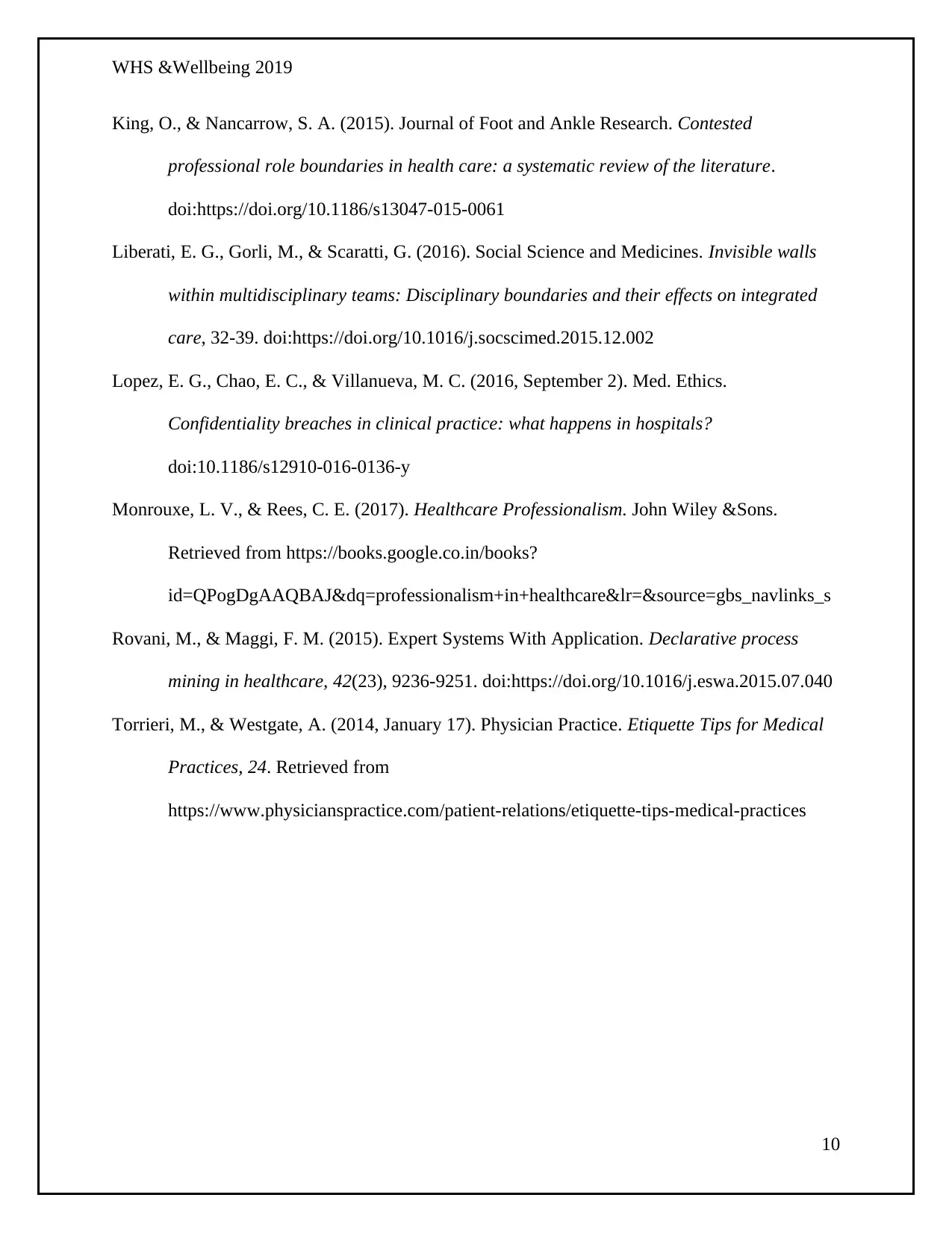
WHS &Wellbeing 2019
King, O., & Nancarrow, S. A. (2015). Journal of Foot and Ankle Research. Contested
professional role boundaries in health care: a systematic review of the literature.
doi:https://doi.org/10.1186/s13047-015-0061
Liberati, E. G., Gorli, M., & Scaratti, G. (2016). Social Science and Medicines. Invisible walls
within multidisciplinary teams: Disciplinary boundaries and their effects on integrated
care, 32-39. doi:https://doi.org/10.1016/j.socscimed.2015.12.002
Lopez, E. G., Chao, E. C., & Villanueva, M. C. (2016, September 2). Med. Ethics.
Confidentiality breaches in clinical practice: what happens in hospitals?
doi:10.1186/s12910-016-0136-y
Monrouxe, L. V., & Rees, C. E. (2017). Healthcare Professionalism. John Wiley &Sons.
Retrieved from https://books.google.co.in/books?
id=QPogDgAAQBAJ&dq=professionalism+in+healthcare&lr=&source=gbs_navlinks_s
Rovani, M., & Maggi, F. M. (2015). Expert Systems With Application. Declarative process
mining in healthcare, 42(23), 9236-9251. doi:https://doi.org/10.1016/j.eswa.2015.07.040
Torrieri, M., & Westgate, A. (2014, January 17). Physician Practice. Etiquette Tips for Medical
Practices, 24. Retrieved from
https://www.physicianspractice.com/patient-relations/etiquette-tips-medical-practices
10
King, O., & Nancarrow, S. A. (2015). Journal of Foot and Ankle Research. Contested
professional role boundaries in health care: a systematic review of the literature.
doi:https://doi.org/10.1186/s13047-015-0061
Liberati, E. G., Gorli, M., & Scaratti, G. (2016). Social Science and Medicines. Invisible walls
within multidisciplinary teams: Disciplinary boundaries and their effects on integrated
care, 32-39. doi:https://doi.org/10.1016/j.socscimed.2015.12.002
Lopez, E. G., Chao, E. C., & Villanueva, M. C. (2016, September 2). Med. Ethics.
Confidentiality breaches in clinical practice: what happens in hospitals?
doi:10.1186/s12910-016-0136-y
Monrouxe, L. V., & Rees, C. E. (2017). Healthcare Professionalism. John Wiley &Sons.
Retrieved from https://books.google.co.in/books?
id=QPogDgAAQBAJ&dq=professionalism+in+healthcare&lr=&source=gbs_navlinks_s
Rovani, M., & Maggi, F. M. (2015). Expert Systems With Application. Declarative process
mining in healthcare, 42(23), 9236-9251. doi:https://doi.org/10.1016/j.eswa.2015.07.040
Torrieri, M., & Westgate, A. (2014, January 17). Physician Practice. Etiquette Tips for Medical
Practices, 24. Retrieved from
https://www.physicianspractice.com/patient-relations/etiquette-tips-medical-practices
10
1 out of 11
Related Documents
Your All-in-One AI-Powered Toolkit for Academic Success.
+13062052269
info@desklib.com
Available 24*7 on WhatsApp / Email
![[object Object]](/_next/static/media/star-bottom.7253800d.svg)
Unlock your academic potential
Copyright © 2020–2026 A2Z Services. All Rights Reserved. Developed and managed by ZUCOL.





